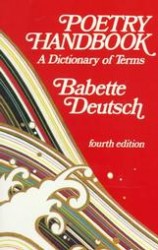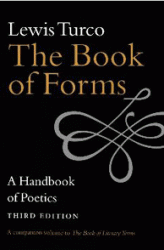This week’s bookshelf features two older favorites that are timeless in their artistry and information. Published in 1982 and 1968, Deutsch”s Poetry Handbook and Turco”s The Book of Forms offer enduring value to generation after generation of poet. There is a general belief that poets who embrace free verse scorn form and tradition, but nothing could be further from the truth. To examine the works of any contemporary poet is to realize that the conventions of poetry are not broken lightly. Rather, there is purpose in even the most egregious smashing of traditional forms and strictures.
If you have never stretched your mind to the challenge of writing a sestina, or toyed with words in an acrostic poem, never attempted the graceful turn at the precisely right point in a sonnet or attempted to fit your words to any of the literally hundreds of forms of poetry that exist in the world, then you have done yourself a disservice as a poet and as a lover of words. These two books belong side by side on every poet”s bookshelf as a reminder of what wordplay and form can lend to poetry.
Poetry Handbook: A Dictionary of Terms (Babette Deutsch)

An oldie but goodie, Deutsch”s dictionary of poetic terms is a must have on every poet”s bookshelf. You”ll find no touchy-feely exercises here, just plain straight (and poetic) talk about definitions of terms used in poetry. The collection of definitions is liberally illustrated with examples drawn from the best poetry of all ages. If you wondered precisely how many lines to use in a rondelet, whether your poem is an abstract or a concrete poem or how to write a sestina, Deutsch has the answers here. Deutsch”s definitioh show no bias toward rhymed, blank or free verse – she simply defines the terms in elegant, clear language and makes concise comments on forms and examples. Published by Harper Ferry, Poetry Handbook is still in print and easily available new, used or at the library.
The Book of Forms (Lewis Turco)

Another oldie, The Book of Forms is an encyclopedia of poetic forms that is imbued with the personality of its author, Lewis Turco. Turco liberally holds forth on his ideas of poetic form, and illustrates his definitions with examples drawn from the world of poetry. In a 2004 interview with author Turco, Daniel Nester stated:

Like Poetry Handbook, The Book of Forms remains in print and is easily available at most bookstores. Find it. Read it. Enjoy it.


You must register to comment. Log in or Register.